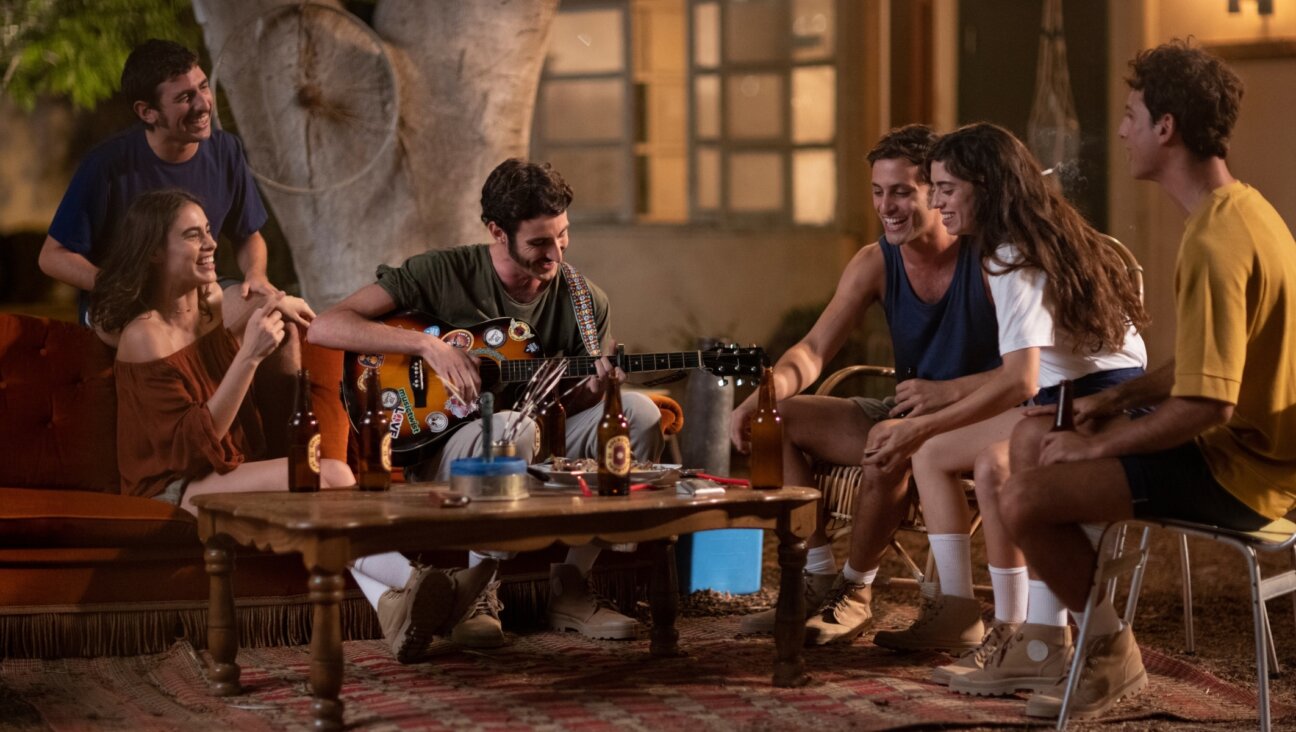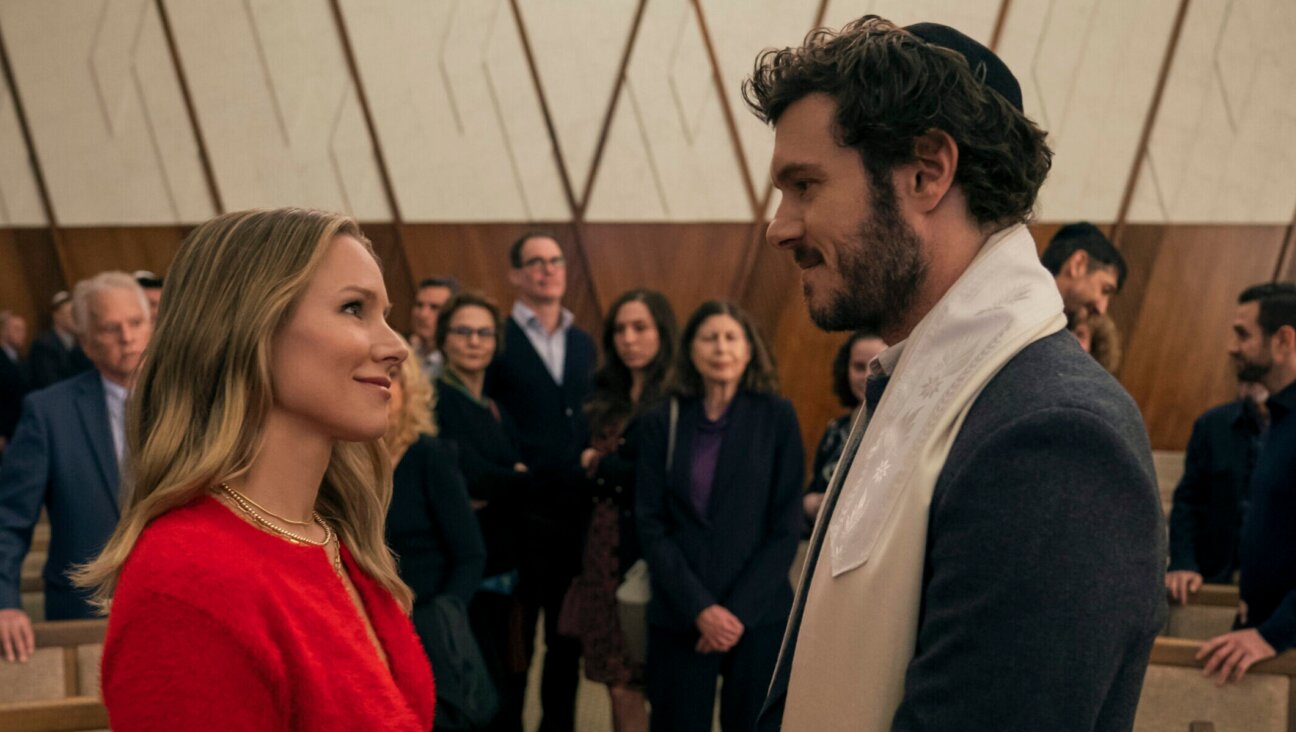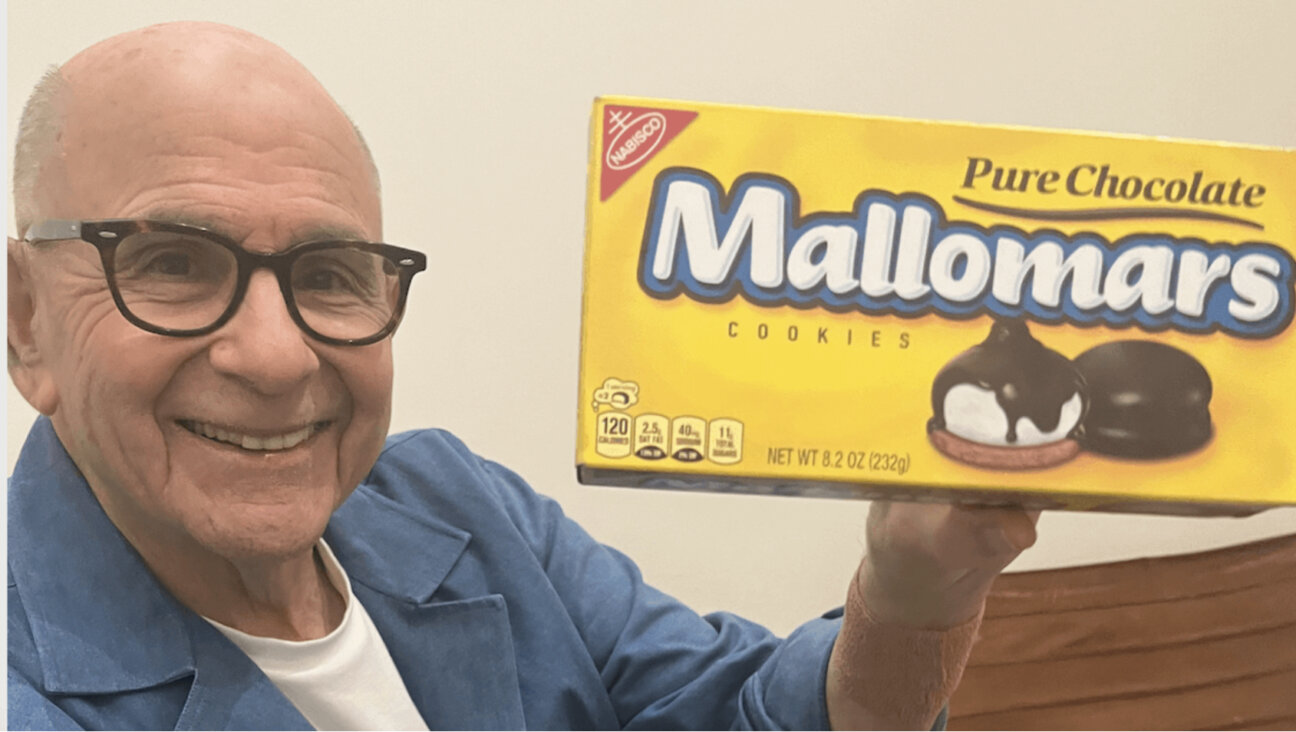The Jew-iest episodes of ‘The Simpsons’ will get you through quarantine

A D23 expo presentation on “The Simpsons.” Image by Getty/Angela Papuga/Staff
For many, comfort TV has an address: 742 Evergreen Terrace in Springfield, state unknown.
This, of course, is where the Simpsons clan has lived since 1989.
With a half-life roughly as long as that rod of uranium Homer flings off-screen in the opening credits, the show in its entirety runs longer, by far, than Shakespeare’s entire oeuvre. Because of its longevity, it’s been a soothing mainstay for viewers of multiple generations. And its sensibility, due in part to original producers James L. Brooks and Sam Simon and writer Mike Reiss, has often been a Jewish one. So, while you work to stay entertained through social distancing, here are some chosen episodes for the Chosen people — all available to stream on Disney Plus.
1) Dustin Hoffman plays Lisa’s favorite mentor
In “Lisa’s Substitute” (1991), the middle Simpson child’s out-of-place genius is recognized by substitute teacher Mr. Bergstrom (Dustin Hoffman,) who has one of the greatest intros ever for a guest star: He walks into class dressed as a cowboy and challenges students to find three anachronisms in his costume. Among them, Lisa notes that Bergstrom appears to be “of the Jewish faith,” and observes that there were no Jewish cowboys.
“For the record, there were a few Jewish cowboys, ladies and gentlemen, big guys who were great shots and spent money freely,” Bergstrom says. He leaves town by the end of the episode, after encouraging Lisa’s love of learning and urging Homer to serve as a better role model, but has a lasting effect on Lisa’s development and sense of self. Proof of his impact on Lisa, and us: He came back for a cameo 23 seasons later as a sight gag, when Marge tries to coax Lisa down to dinner by telling her her veggies were buttered by “someone who loves her.” That someone, it turns out, was Bergstrom.
2) The Krustofsky chronicles
The most prominent Jewish character on “The Simpsons” is undoubtedly Krusty the clown (birth name: Herschel Schmoeckel Pinchas Yerucham Krustofsky). The season three episode “Like Father, Like Clown,” (1991) shed light on the children’s entertainer’s roots in a parody of “The Jazz Singer” in which Krusty, visiting Bart for dinner, recalls his youth on Springfield’s Lower East Side. His rabbi father, Hyman, (Jackie Mason) wants him to follow in his footsteps. When Hyman discovers Krusty clowning, he disowns him. But Bart and Lisa are able to persuade Hyman into a reunion by quoting a great man: “The Jews are a swinging bunch of people. I mean, I’ve heard of persecution, but what they went through is ridiculous. But the great thing is after thousands of years of holding on and fighting they finally made it.” Hyman wonders who said it. Hillel? Maimonides. Nope: Sammy Davis, Jr.
Later, in season 15’s “Today I Am a Clown” (2003), we learn that Krusty, now reconciled with his father, never became a man in the eyes of the Jewish community. Naturally, he decides to finally get bar mitzvahed after learning it’s a prerequisite to being part of the Springfield Lower East Side’s Jewish Walk of Fame, a walkway that includes Chaim Potok, Joan Rivers and both Shari Lewis and her puppet Lamb Chop. Krusty learns about his faith from his father and has an exuberant, Tiffany Haddish-style televised coming-of-age special titled “Krusty the Clown’s Wet ‘n Wild Bar Mitzvah,” as well as a smaller, more subdued ceremony at his father’s synagogue.
In the season 21 episode “Once Upon a Time in Springfield,” (2010) Krusty experiences yet another rite of passage when he hopes to marry the new co-host of his eponymous TV show, Penelope Mountbatten-Hohenzollern-Mulan-Pocahontas, aka Princess Penelope (Anne Hathaway). Needless to say, she is not a member of the Tribe, which upsets the officiating Hyman, who says during the ceremony, “Friends, loved ones we are gathered here today to marry a Jew and — a Congregationalist? Is that even a thing?” But the pair don’t make it to their vows. Bart and Milhouse — worried that Krusty and Penelope’s union might mean a permanent kiddy-fication of Krusty’s antic show — pull out evidence of Krusty’s failed past marriages (to Eartha Kitt among others) and convince him he doesn’t deserve her. But Krusty soon has a change of heart, reuniting with Penelope in Paris, where she calls him her “Borscht Belt baby.”
In 2014, “Clown in the Dumps” saw the death of Hyman, but Krusty visited his newly-departed father in a stupor-inspired vision of the afterlife (Jewish heaven, which is also a playable map in a Simpsons video game).
But don’t worry: Hyman still makes regular appearances in flashbacks and Krusty’s dreams, often serving as a voice of wisdom and compassion — including in season 28’s “The Nightmare After Krustmas” (2016), when Krusty, converting to Christianity for his Christian daughter, slips through a frozen lake during an attempted baptism performed by Reverend Lovejoy. In the cold water Krusty hallucinates Hyman (looking like Olaf from “Frozen”), who tells him, “There’s no one religion that makes you a good father. All you got to do is think of your children before yourself, that’s all… except with those oxygen masks that you get on the planes.”
3) The Simpsons go to Eretz Yisrael
In season 21’s “The Greatest Story Ever D’ohed” (2010) the family follows Ned Flanders to Jerusalem as part of a church retreat. There, the family meets tour guide Jakob (Sacha Baron Cohen) who mainly takes them to sites that are of Christian interest. But the episode’s Jewish spirit is strong. Homer gets tackled by airport security for claiming latkes are worse than American pancakes (he’s released when he confesses they’re OK with applesauce). Bart skateboards on the Kotel and, for his disrespect, takes a beating from Jakob’s krav maga-practicing niece. Homer discovers a brand of Israeli sodas called “Oy!” We even get a sneak peak of a Jewish “Transformers” in which the robots power down to read Torah on Shabbat.
But really, the selling point is Baron Cohen, who perfectly straddles the line between offensive stereotype and pitch-perfect embodiment of a certain type of Israeli man. I mean, just watch this:
PJ Grisar is the Forward’s culture fellow. He can be reached at [email protected]
























